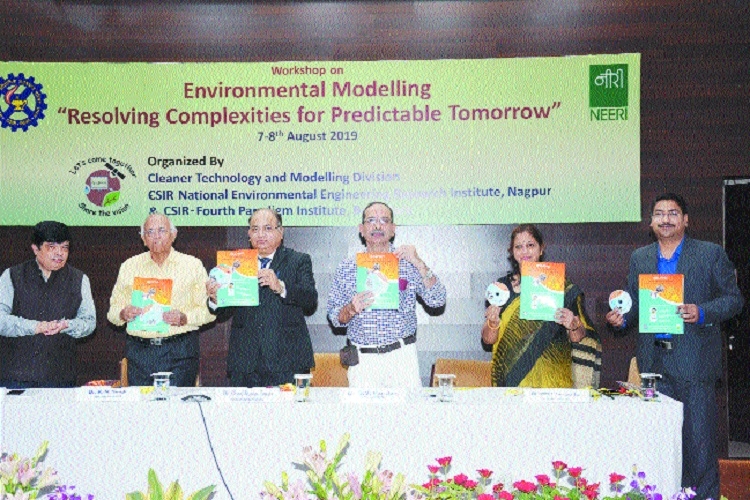‘Use big data for effective water management’
| Date :08-Aug-2019 |

Vinodkumar Tiwari, Member (Law and Groundwater), MWRRA receiving a memento from Dr J S Pandey, Chief Scientist and Head, CCSD, CSIR-NEERI. Dr R N Singh, Visiting Professor, IIT-Gandhinagar and
former Director, CSIR-NEERI; Dr R B Biniwale, Head, CTMD, and others also are seen.
Staff Reporter:
“Water management in Maharashtra is a big challenge which can be overcome through application of big data, real-time data and artificial intelligence,” said Vinodkumar Tiwari, Member (Law & Groundwater), Maharashtra Water Resources Regulatory Authority (MWRRA). Tiwari was speaking as chief guest after inaugurating the three-day workshop on ‘Environmental Modelling: Resolving Complexity for a Predictable Tomorrow’ organised by CSIR-National Environmental Engineering Research Institute (NEERI). The workshop was inaugurated on Wednesday and will conclude on August 9 (Friday).
Dr R N Singh, Visiting Professor, IIT-Gandhinagar and former Director, CSIR-NEERI, was the guest of honour. Dr J S Pandey, Chief Scientist & Head, Climate Change and Skilling Division, CSIR-NEERI; Dr R B Biniwale, Head, CTMD; and Dr Aabha Sargaonkar, Senior Principal Scientist, also were present on this occasion. Addressing the participants, Tiwari described the genesis and role of MWRRA. Maharashtra is the first State in India having MWRRA for water resources development and management to meet the challenges of 21st Century.
He said that MWRRA was looking at ways to bring in category-based measurement of water usage as there was no accurate measure or regulation for usage of fresh water for agricultural and industrial purposes, which led to considerable water wastage or excessive water withdrawal. He felt that the concept of MWRRA should be extended to other States. He expressed concern over rural-to-urban migration due to water crisis. He cautioned that groundwater should not be exploited for irrigation and industry, but should be used exclusively for drinking. He urged the scientists to implement the concept of big data to encourage and ensure more responsible water usage in the country through measurement, auditing and possible pricing mechanisms.
Dr R N Singh said that mathematical modelling was an experimental approach, wherein a problem was solved and continually refined over time in order to be more efficient, faster or more accurate. He advised the scientists to break up the complexity of a problem in various parts and deal it through mathematical modelling to make it simpler. This approach may be used to provide solutions to various environmental problems, he added. While emphasising the importance of reductionism in problem solving, Dr Singh said that complex problems could be simplified in a way that made them easier to understand. Everyone should understand linear dynamics and algebra to solve a problem, he added.
During the technical session, Dr R D Singh, former Director, National Institute of Hydrology, Roorkee, highlighted advancement in hydrological modelling. Dr K C Gouda, Principal Scientist, CSIR-Fourth Paradigm Institute, spoke on ‘weather and climate big data’. Dr P V Timbadiya, Associate Professor, S V National Institute of Technology, Surat, briefed about application of big data analytics and artificial intelligence in hydrological modelling. Prof Anurag Garg, Professor, IIT-Bombay spoke on energy and mass flow modelling in municipal solid waste management. Prof Maithili Sharan, IIT-Delhi; Prof B R Gurjar, IIT Roorkee; Dr Sachin Ghude, Scientist, Indian Institute of Tropical Metrology, Pune; Asha Purna Marndi, Scientist, CSIR-Fourth Paradigm Institute, and Swapnil Srivastava, C-DAC, were the other experts. Earlier, Dr J S Pandey delivered welcome address. Dr R B Biniwale gave an overview of the workshop. Dr Aabha Sargaonkar proposed a vote of thanks. The dignitaries released a modelling tool and software RISK-PiNET, developed by CSIR-NEERI. It can be used for risk assessment and rehabilitation planning of water distribution system.